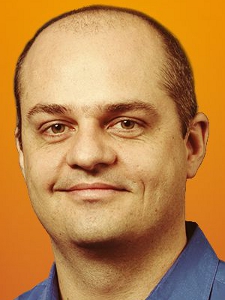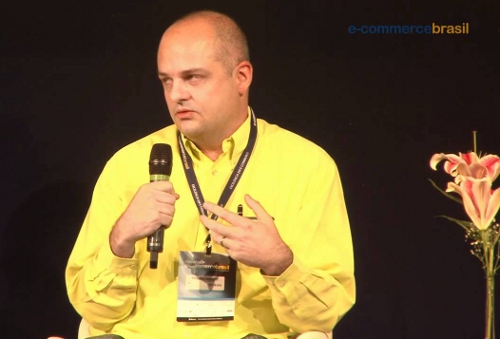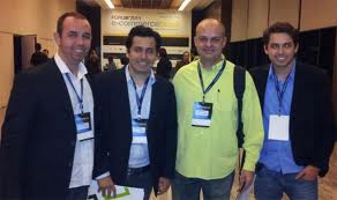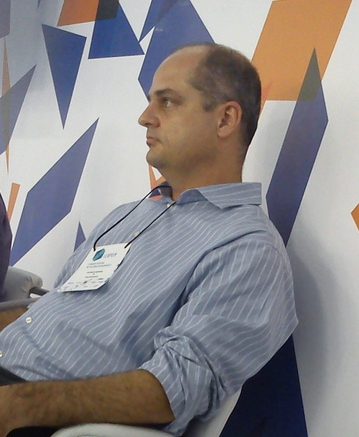- What Is The Future Of Venture Capital In Brazil?
- What Is The Internet Investing Climate in Sao Paulo?
- Which Are The Upcoming Startups in The Brazilian Tech Environment?
Full Interview Audio

Personal Info
Sports Teams:Stanford Cardinals, Sao Paulo soccer team
Most Influenced By:Sergei Brin, Larry Page
Website: http://www.dgf.com.br
Interview Highlights
This is a condensed, lightly edited transcript of an audio interview. The full audio is available and highly recommended. The interviewee may post clarifications in the comments.
?Adrian Bye: Today I’m here with Patrick Arippol who is from DGF Investments in Sao Paulo in Brazil. Patrick, thanks and welcome. 
Patrick Arippol: Pleasure to be here. Thank you.
Adrian Bye: So, Patrick, we just spoke a little bit before the interview started. You have an accent and I’m presuming you are Brazilian. Maybe can you tell us a little bit about who you are and where you’re from?
Patrick Arippol: I was born and raised in Brazil, I guess that is the origin of my accent. My mother being from the US ended up leading me to want to start my career there, which I did at Seer Technologies. Then I worked with strategy consulting for IT. At that point I took the plan to do startups down in Brazil. I did that from the pre-bubble years to the post-bubble years, which was an interesting time frame. After that I decided let me see how things work in Silicon Valley, which took me to the Valley in 2002. I did my MBA, launched the startup and at that point I decided to start working with investments. That led me to launch a fund, which I led from 2007 to 2010. Then I came back to Brazil and joined the folks here in DGF in the early stage practice, which I have been doing since. I’ve lived in different countries, worked a bit in the US, Brazil, Argentina, did some projects in India in the early stage of my career. I guess I call myself a Silicon Valley/Brazilian entrepreneur.
Adrian Bye: Why did you move to Sao Paulo?
Patrick Arippol: In one way the market here is very green. The market matured a lot since my first startup experience here ten years ago, and that is very exciting. The market is more mature, is more willing to buy, different products, technologies. So you are able to find critical mass in some areas that we were not able to find ten years earlier. I guess having learned a few things over there in the Valley there is a lot that can be translated down to here. Obviously a lot of things just can’t, they don’t make sense, but it’s easier to make a very solid impact down here than it might be in Silicon Valley. Especially joining a bit both worlds, the skills and networks from the Valley to invest in tech with a very deep down establishment within the startup environment, which is DGF. They’ve been doing investments here for over ten years, which for Brazil is a long time. Joining the best from both worlds ended up being a very interesting combination. 
Adrian Bye: Tell us a bit about the startup scene in Brazil. Maybe if you could just describe who do you see as the leading companies and what you see is going on?
Patrick Arippol: The market as a whole right now is facing a very exciting moment. The number of Brazilians going out there to launch a company or to incubate a company and bring it down here or some variation of that is very large. There is a volume of exchange of insights and maturation of the local entrepreneurs that is very substantial. But how does that translate into what is happening now in Brazil? I guess many would agree that there was a wave of entrepreneurs and series A rounds and Angel rounds and tech startups, especially from mid 2001 to mid 2012. That wave to an extent has receded. Right now a few of those companies are up and running, they have critical mass. A few of those have closed down or some of those sectors are consolidating some of the players. Right now it’s more a matter of resilience for investors and startups. This is a time where the investors that are here for the long haul really stand out, and the entrepreneurs that are really here seriously and are not doing entrepreneurship for the romantic reasons. They know it’s tough, it’s not easy, it’s challenging. We are separating the serious entrepreneurs and the serious investors from a few other ones that were just trying.
Adrian Bye: That’s interesting. So is the internet environment in Brazil at the moment not as strong as it was say a year ago, or two years ago?
Patrick Arippol: I won’t say it’s not as strong. I’d say revenue-wise it’s as strong or stronger. It’s just a matter of that there were too many bets. There are a few areas in particular in eCommerce and a few other sectors where there were two, three, four, five investments in the same pieces, and this is not a market that is large enough to have five, six success cases in the same category of eCommerce.
Adrian Bye: What are some of the startups then that you guys have worked with?
Patrick Arippol: We have one company for example which was the first investment from this fund, which is called Ingresse. It’s basically a technology company to lever the sales of tickets online through new technology such a social networks, mobile phones and so forth. Our thesis was based on the concept that from all products that you can sell online an event is really the most social product because you want to know who’s going to be at the event. If it’s a business event who else is going to be there that you want to meet? If it’s an entertainment event, is your ex-girlfriend going to be there if you want to avoid her or if you want to find her? All this information is relevant. In essence it levers from these new technologies and we think there’s a great inflexion point in Brazil. One of the differences to here is even though the number of social network users and mobile phone users is smaller than the US, they are more avid users. We think it’s a thesis that Brazil could allow for the development of a technology even beyond what we find that are comparable to the US and other countries. So we’ve backed an entrepreneur. He is relatively young, he’s doing extremely well so far. That’s one company. We have another one which is a business intelligence solution for health care. We are very excited about the bets we’re making. Of course we know there will be a lot of challenges before they reach what we think they’re able to reach.
We think we also understand how the market will buy the technology, and it’s very different here than the sales process that takes place in the US. So of course part of our thesis and a lot of the things that we invest in we think very carefully about customer acquisition cost versus lifetime value. Usually the customer acquisition strategies are very different from what we see the US players doing in the US market. All of those things of course we have to make sure are adapted.
Adrian Bye: What do you see happening in the Brazilian market over the next couple of years?
Patrick Arippol: For sure, the market has been evolving and I think is going to continue to evolve quite rapidly. The speed in which things have been picking up in the last few years has been amazing. I think one of the adjustment aspects that’s going to take place is that a few investors and VCs have made one or two deals to test the waters. A few of those are going to say great, go on, build a fund, etc. A few other ones are going to say you know what, it’s a little more difficult, or these few investments didn’t work out. So it’s going to be some self-selection I guess. And this applies to both investors and a few entrepreneurs/corporate development arms. You have a few tech companies based out of the US, Europe, Asia, that have looked here and a few of them are going to follow through and invest and do acquisitions. A few of them might wait for different times. So it’s just a phase in which it’s going to be some adjustments but at the same time I really think that one of the things that Brazil is really lacking right now is a lot more great success stories. I have a company that did extremely well, that went from zero to a hundred to five hundred very rapidly and effectively and dominated a market locally and even in a second stage, globally. I think there is a good amount of chance of there being one or two cases like this in the next five or so years. And hopefully in the next ten years we will have a few more. So I think a good outcome and an expected outcome in my viewpoint is that we’re going to have a few of these successes. 
Adrian Bye: In the short-term, are you somewhat bearish on how Brazil is doing for internet?
Patrick Arippol: No, not at all. There is a lot to be optimistic about, but you can’t forget the fundamentals. You can’t forget the floor upon which you’re standing. I think that a wave happened a bit in 2010, 2011. And now, that’s being adjusted. So the adjustment that was already happening most of it has already played itself out. I think actually some very good investments are going to happen in the next two years. Companies that haven’t been backed yet are going to maybe get some funding. I think we’re going to see a lot happening in the next few years.
Adrian Bye: What do you think will be the stand-out internet companies in Brazil?
Patrick Arippol: That’s a good question. In the eCommerce area Dafiti and Netshoes. And probably a few more will be well established. There is also another stand-out company which is MercadoLivre, which had its very interesting relationship with ebay. It’s doing interesting things. It’s become agile, it’s remained agile and it’s looking at startup opportunities that can leverage its technology base. So on the large company scale, I think those are a few of them. On the technology side, there are five, six players that are well placed in the market, and it’s a very green market. You have a few large retailers, you have a few very large product companies in different segments. By and large, the industry is more consolidated. So if you’re a startup you try to sell technology or you try to sell ad technology or something like that to those players. You have to think very carefully about your strategy.
Adrian Bye: Tell us a little bit about your particular firm. You went out and raised some funds. How did all of that work?
Patrick Arippol: In 2010 I went back to Brazil. I had known the guys from here from one of my fund-raising processes when I was raising for the companies that I launched in Silicon Valley actually. And we stayed in touch. So for about five, six years we spoke with each other. When I came to Brazil, I spoke with them and vice versa when they went to Silicon Valley. At that point when we were in one of these networking meetings when I had decided to come down to Brazil, I did two weeks of really trying to figure out what was going on in Brazil. What of it is sustainable, what’s not? In these conversations we ended up talking and they wanted somebody to run their early stage practice. DGF has three practice areas, the core of it is growth equity. They have funds which I guess in Brazil we call them growth equity, investing checks from let’s say 10 million US to about 30 million US, which could be either a Series B, Series C, or could also be an investment in a more mature company. Their core of DGF is really the growth equity and early-stage investing is also a good way for any firm to stay in touch and stay on top of the new trends etc. and all the synergies between that and early stages of practice, I came in to round that practice. Basically, they had started to getting commitments for this fund and I came in and ran the rest of the fundraising process. We closed the fund and we launched in January of 2012. So we had a delay, not for the fund raising, but for the regulatory aspects to get the fund up in the air.
Adrian Bye: People look at Brazil and say it’s a Third World country. But you have something like ten billionaires living down there, haven’t you?
Patrick Arippol: Yes, there are some very successful entrepreneurs. One group, I think they are called 3G, which is three very successful entrepreneurs in Brazil. The InBev Group, which acquired Anheuser-Busch, which is now I think one of the largest beer companies in the world, they were driven by these Brazilian entrepreneurs. They also, as a group, are doing investments in the US. They acquired Burger King and now Heinz Ketchup. So there are many well-to-do entrepreneurs, yes. Not so much in the technology areas, but we were hoping that will change in the next few years.
Adrian Bye: Is there anything you want to tell us that we haven’t already discussed?
Patrick Arippol: Yes, just a general point, Adrian, if I may. I think the Brazilian market is a great market, it has critical mass, it’s gone through a lot of maturity in the last few years. It remains a very interesting market place. But right now it’s my thesis that it will be successful in terms of startups, in terms of investments it will be a little bit more nuanced. So it’s more of a mixture between what’s out of Silicon Valley, Asia, Europe makes sense, proves a working model, and what works or doesn’t work down here in Latin America more broadly and what exactly you’d have to adjust. I think it’s a more nuanced market. It’s a great time if you can find the way to join that global insight with the local insights, and I think from that we will see a lot of great successes in the next few years.
Adrian Bye: Awesome. Patrick, thank you very much for the interview.
Patrick Arippol: Thank you Adrian. It was a pleasure.









